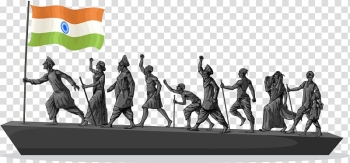
 P. A. Chacko
P. A. Chacko

This India belongs to all of us. The controversy about who is real Indian is fallacious. It can only stoke hatred, division, and inhumanity.
Questions such as who came first, who came last, who are the invaders, and who are the real inheritors of India’s culture and nationality are being raised from rooftops.
Let us for a moment think that the communities that are here at least for a century are all Indians. In fact, we are all migrants or invaders in one sense. Ages ago, the Indian subcontinent belonged to no one. Our earliest forefathers entered India from distant lands, be it Eurasia, Mid Asia, West Asia, East Asia, or any other continent.
Archaeologists tell us that there were some earliest settlers in the Indus valley. Today we call them the indigenous. The Adivasis claim that they were the earliest settlers in the Indus valley. Then came the Aryans, and, later, the Muslims.
The Indian population, be it the Adivasis, Hindus, Muslims, Christians, Jains, Buddhists or any community or religious denomination, entered India at different times and settled down here.
Some came as traders, some as migrants, and some as vagrants! Those with muscle power captured power over people and declared themselves as rulers. Some rulers were genial, while some others were self-serving predators. Some mixed politics with religion. Some emotionally charged their followers with community or communal sentiments.
Today, India is a spectrum of these different groups and communities, cultures or religious factions. We have no option but to accept them all as nationals of India. Their nationality should not be marked by which religion they belong to or which language they speak.
We are all Indians. Our Indianness is in our blood which is not generated from any religious shrines, churches, temples, gurudwaras or mosques. Nor does our national Constitution define our nationality by the dress we wear, by the tilak on our forehead, by the colour of our skin, by the medal we wear or by the sound of our chant.
Our religious sentiments need to belong to the realm of our private chambers and our devotion to our gods must be confined to our personal allegiance to this god or that goddess. No religious group, be it majority or minority, can dictate to us to define our nationality or nationalism under the umbrage of its umbrella politics. Nor does our secular Constitution permit it.
The way certain factions or groups claim superiority over others as true nationalists or hijack nationalism as their private prerogative only creates divisive tendencies and insecurity among others. Especially when such modus operandi becomes aggressive and is mixed in political cauldron, it has no other name but terrorism. Such terrorist model of street theatricals graduates from pinching to lynching, from communal politics to bulldozer governance.
This is not the shape of India our forefathers bequeathed to us especially after winning us an Independent India. In no way did they mean that from political slavery we shift to religious majoritarian slavery. By giving us the Constitution, they had laid the foundation for a cohesive nationalist India where all of us, while belonging to cultures and communities, religions and tribes, bury our differences and live in fellowship for the good of all and for the good of the nation.
If any community or faction defines India or Indiannes or nationality or nationalism according to its religious concepts or political convenience, it is not only an aberration but borders on anti-national tendency. Anti-national, because their exercise cuts the very root of our common nationalism.
We have been witnessing horrific events over a few decades where people of other religions or communities are attacked, their worshipping places burned or destroyed, their residences bulldozed, their near and dear ones lynched and massacred before their very eyes. The faults of the victims have been the way they dressed, the way they prayed, the way they moved about, the way they chose to marry or the way they lived.
The amity and unity with which Indians have been living harmoniously for ages have been shattered by the kind of political mishmash creamed with religious fanaticism and wanton terrorism.
Let those, who preach to us about true nationalism, ask themselves which nationalism they speak of. Indian nationalism or a majoritarian nationalism? Inclusive nationalism or a fundamentalist religious nationalism? A rational nationalism or an irrational and illogical nationalism which believes in bloodletting, political vendetta and communal disharmony?
We have seen enough and more. The nation is being taken for a ride by politicians who hoodwink people by pandering to cheap religious sentiments and the political game of throwing crumbs to feed the weak and the gullible. Such skewed nationalism, ensconced in political power, arrogates to itself muzzle not only to pulverize any dissenting postures but also to sell off national assets as private property to chums and cronies and lets off the hook business tycoons with hefty bank loans.
Instead of governing the nation under the given Constitutional rules and provisions, the leaders want to re-write the Constitution to fit their agenda modelled on ancient religious texts. That is where secular India is being given a back seat while the majoritarian clan is in the driving seat.
Possibly for instant result, the ruling faction wants to drive the nation to a precipitous cliff. The end result can be disastrous.
Should we throw up our hands in the air and say we are helpless? ‘The answer, my friend, is blowing in the wind!’